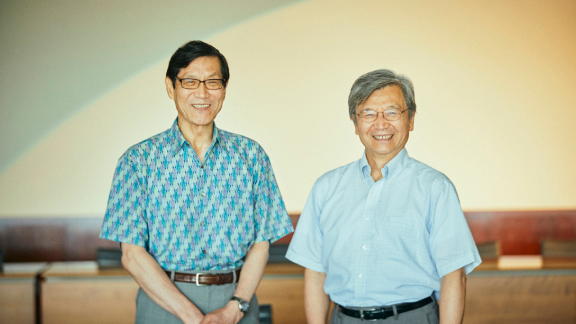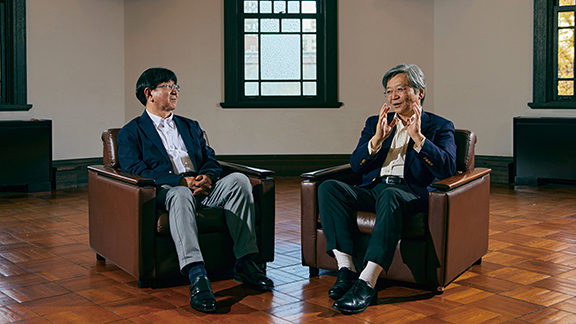Dialogue series Vol.3
Updating the humanities and social sciences with the power of information mathematics!
How will the creation of the Faculty of Information and Mathematical Sciences affect existing humanities and social science disciplines? Associate Professor Kago Inukai of the Faculty of Economics, who specialises in data-oriented behavioural and experimental economics, and Professor Tatsuya Kameda of the Graduate School of Humanities and Social Sciences at the University of Tokyo, a social psychologist known for his interdisciplinary research incorporating experimental methods and familiar with the curriculum areas to be addressed by the new Faculty, discuss education and research in the new Faculty, as well as expectations for the Center for Interdisciplinary Informatics. He discussed his expectations for the Centre.
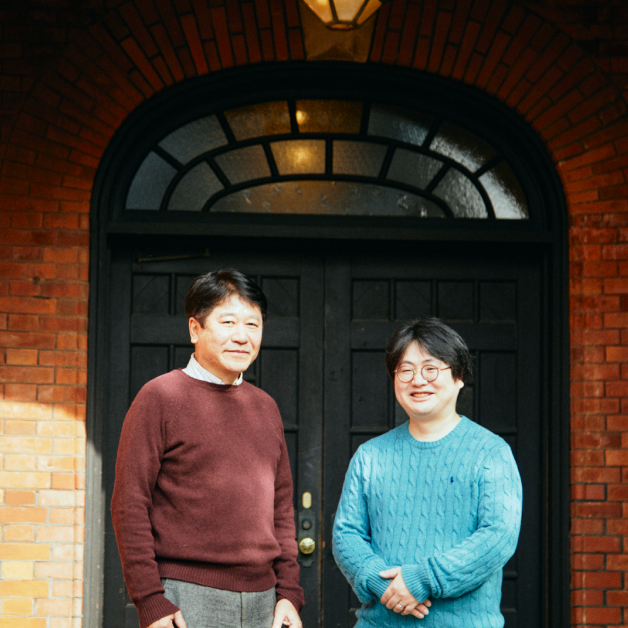


Table of Contents
- The value of information mathematics as revealed by the research of two unique scholars who brought "experimentation = information mathematics" into "humanities" disciplines such as social psychology and economics.
- Changes in research methods and a game change in academia are now inevitable.
- The new Faculty of Informatics and Mathematics is not so much responding to "what society wants" as "changing society" and "changing the world".
- The logic of mathematics is made into a thing of 'rustproof knowledge'.
The value of information mathematics as revealed by the research of two unique scholars who brought "experimentation = information mathematics" into "humanities" disciplines such as social psychology and economics.
Please give a brief introduction to your two areas of research.
I always liked physics and mathematics and wanted to study science, but chemistry requires memorisation and I was not good at memorisation, so my thinking rejected it... I got terrible grades and thought I couldn't do science any more. So I switched to the humanities and majored in social psychology at university. However, I had my doubts about research methods from the very beginning. I felt that there were too many verbal interpretations. For example, when I tried to research the human tendency towards tuning in, I thought that although I described the psychological process of tuning in words, I did not answer the principle question of why the tuned-in mind exists and can function, because I assumed that the mental function of the tendency towards tuning in is pre-existing in human beings. Therefore, while I was immersed in the world of social psychology, I was also negotiating a wide range of peripheral disciplines. This coincided with the time when experimental methods were just beginning to be introduced into social science research, so during my 20 years at Hokkaido University, I worked to instil experimental methods as a cross-skewer across various social science research, including social psychology. For this reason, I dare to call my field of expertise 'experimental social science'.
I studied political economy as an undergraduate and discovered the 'experimental' method while researching various things for my graduation thesis. It was just at the time when movements such as 'experimental sociology', 'experimental economics' and 'behavioural economics' were taking place. It was also at that time that I came to know about Professor Kameda. I was attracted to Professor Kameda's method of experimental social science and wanted to study under him, so I contacted him directly and entered the graduate school at Hokkaido University, where he was then teaching. Looking back, I think I was able to study in a very good environment. In particular, the 21st Century COE Programme and Global COE Programme* were underway, and it was very meaningful for me to be there when there was active exchange with overseas researchers and a major movement to bring social science together through 'experimentation'. However, as I came to realise the value of the cross-disciplinary approach, I began to think that it was also important to deepen the vertical approach (the study that serves as my axis). At that time, I decided to shift my focus to economics because I felt that it was the discipline with the most solid vertical skewers. Currently, I am conducting research as a behavioural economist who examines, through experiments, the relationship between the economy and the movements of the human mind and behaviour that arise in new societies, such as the metaverse, and the societies in which they exist.
*A grant programme supported by the Ministry of Education, Culture, Sports, Science and Technology (MEXT) to promote the formation of internationally outstanding education and research centres and the creation of internationally competitive universities in order to further enhance and strengthen the education and research functions of Japanese graduate schools and to develop world-leading creative human resources on a world-class research infrastructure.Started in 2002. It basically follows the concept of the 21st Century COE Programme.

I think social psychology and economics aim in different directions...
This was around 2010, when various scholars attempted to conduct "experimental social science" type research by forming large project teams. For example, an economist and a psychologist each conducted similar experiments and discussed them, but because the conceptual language of their disciplines was different from each other, it was difficult for them to engage in discussion. This is because the respective disciplines have different views of human beings based on each other's assumptions. For example, economics has a pure concept of 'homo economicus', which is based on the idea that humans only act to maximise their own profit, and tries to rationally explain human behaviour from this starting point. In psychology, however, there is no such pure model, but rather a view of human behaviour that is influenced by the society and culture to which one belongs. In a sense, they are two extremes, but through discussions based on data obtained from similar experiments, we have gradually developed a kind of common understanding that we can share with each other. I believe that this kind of accumulation leads to a true understanding of human beings.
Economics studies how social systems work under the assumption that a view of man and a model of man are given from the outset. At first, as a benchmark, we start with the 'homo economicus model' mentioned by Dr Kameda, but when we conduct experiments, we find many things that do not fit into that model. This leads to a discussion about which parts of the model should be changed. However, psychology, which does not have a pure model, refers to various factors to explain the results of an experiment. This means that whatever the results of the experiment are, they can be explained. From an economist's point of view, I feel that this is not clear.
To avoid this, experimental social science makes measurements at various levels. In addition to closely following the behavioural and cognitive processes involved in decision-making, such as what information people pay attention to and which information they process first, physiological reactions in the endocrine and nervous systems and brain activity are also measured to narrow the scope for interpretation. In this way, the model is developed to be closer to reality.
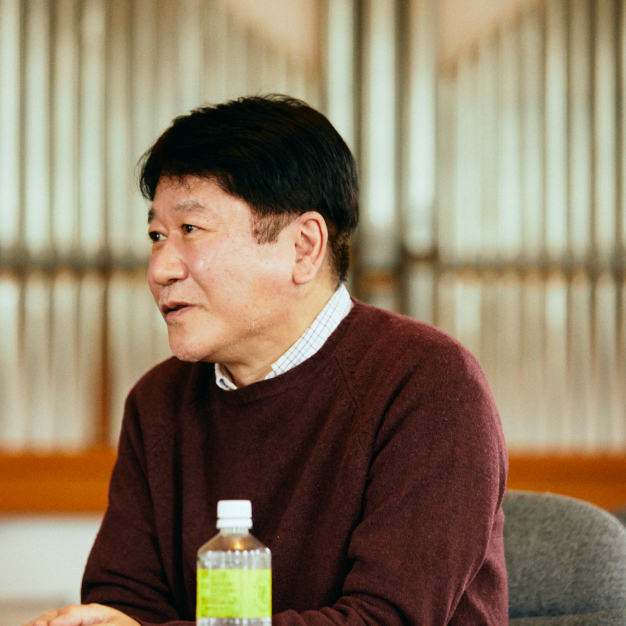
Changes in research methods and a game change in academia are now inevitable.
What do you consider to be the significance of information mathematics in your research?
Economics is basically a 'deductive' discipline, which draws conclusions by making inferences from already known laws and general and universal assumptions, so models have been built using the deductive method. However, since the 2000s, experimental methods have entered economics and there has been a major game change to 'inductive' research methods, which find commonalities between multiple events and derive generalisations. The background to this is the increasing accumulation of big data and the ability to actually use raw economic data. Today, more and more empirical studies are emerging in economics, and it is clear that data science is becoming more and more popular.
In the world of physics, experimental and theoretical physics are advancing on both fronts, so it is important that the two methods complement each other and develop in the social sciences that deal with people as well.
I think so. However, in the past, there was an atmosphere in the economics community in which the theorists had the upper hand and those who conducted empirical research were seen as doing the muddy work (laughs). However, since the game-changing events of the past, I think theorists can no longer be indifferent to the results of empirical research.
The term 'computational social science' was coined at a time when there was a game change in economics. Trying to get data on phenomena occurring in society used to involve huge costs, such as large-scale social surveys, but with the spread of the internet, the net space is now flooded with large amounts of digital data. Extracting data from this is data science, but from beyond that, various disciplines can be approached. It is possible to take instantaneous snapshots of data at a certain point in time, which can then be followed over time to provide data for forecasting. Experiments can provide high-resolution data due to the rigorous conditions, but the field of view is narrower. However, as computational social science using big data develops, it may well be possible to change social science theory through data.
Today, technology tends to take precedence, and people with information and mathematical skills are increasingly entering the field of social sciences. What is important is the perspective of how such people view the models they create from the data. People in economics feel somewhat uncomfortable because they don't know how they extracted the data or how they created the models, but I think that social science researchers have already entered a phase where they are thinking about how to evaluate such models.
While maintaining the basic ideas and research systems of the social sciences in which you specialise, I think it is very important to be information literate enough to communicate with information specialists, in order to understand society and people, which is the purpose of social science. Because both social science specialists and information specialists need to have mutual basic literacy to be able to communicate with each other.
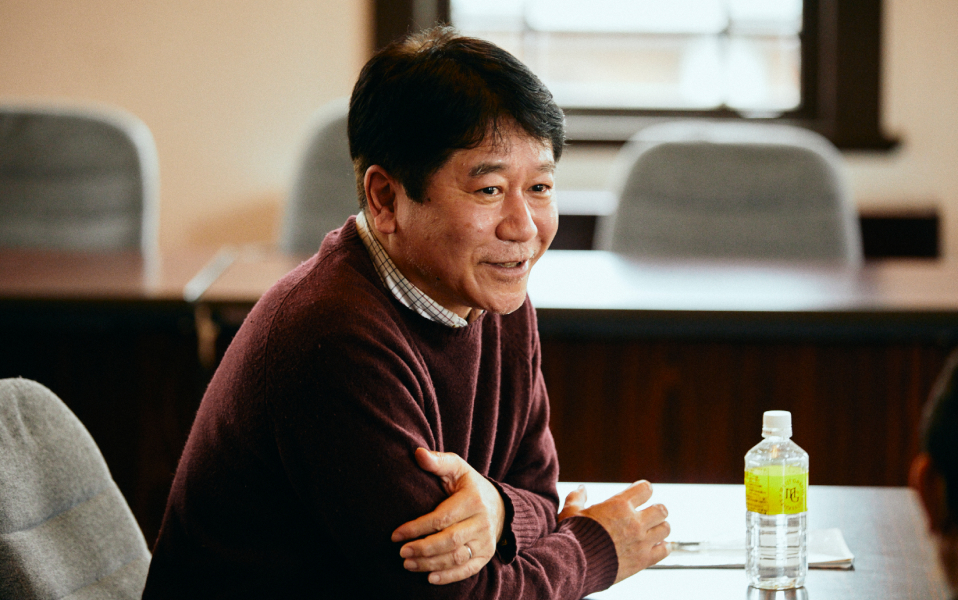
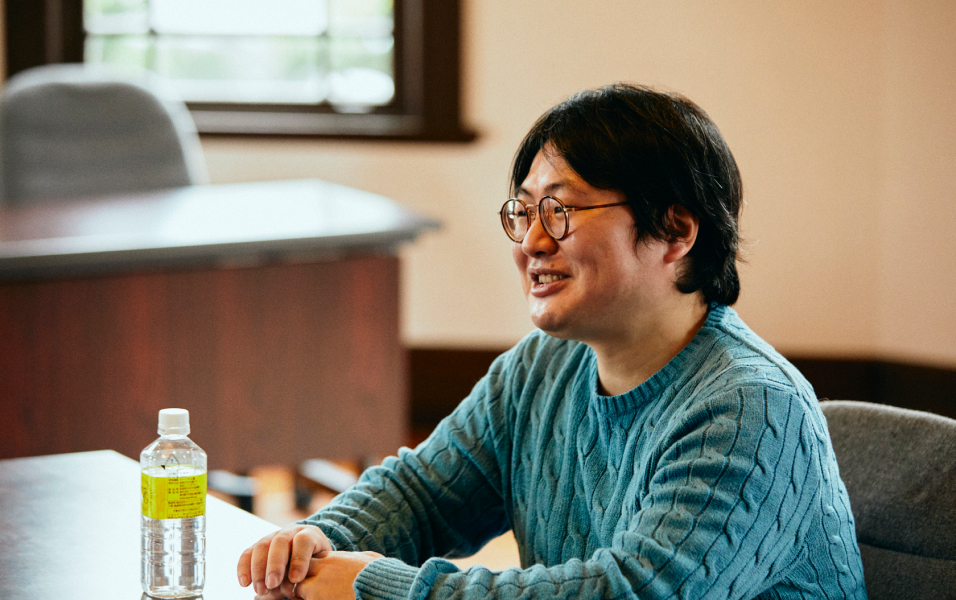
List of articles in dialogue
 Mr. Irie (Denso) ・ Prof. Ota ed.
Mr. Irie (Denso) ・ Prof. Ota ed. Dialogue Series Vol.2 A future is coming that not even Einstein could have imagined. ― The world of "information" changed by quantum mechanics. From there, the Faculty of Information and Mathematical Sciences learns from a future perspective.
 Prof. Kameda and Associate Prof. Inukai, eds.
Prof. Kameda and Associate Prof. Inukai, eds. Dialogue Series Vol.3 Updating the humanities and social sciences with the power of information mathematics! ― Information mathematics is a communication and hub that connects disciplines and people.
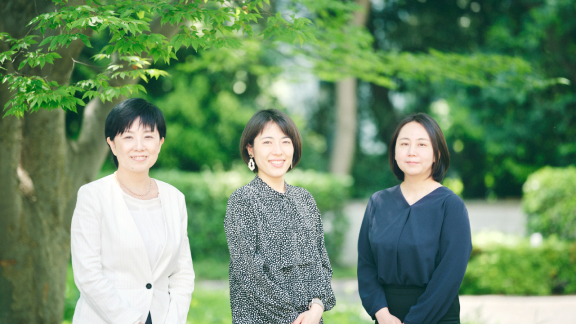 Female Researchers Edition
Female Researchers Edition Dialogue Series Vol.4 A background in informatics and mathematics is the foundation of all science. ― Great Expectations for Integration with Diverse Fields


